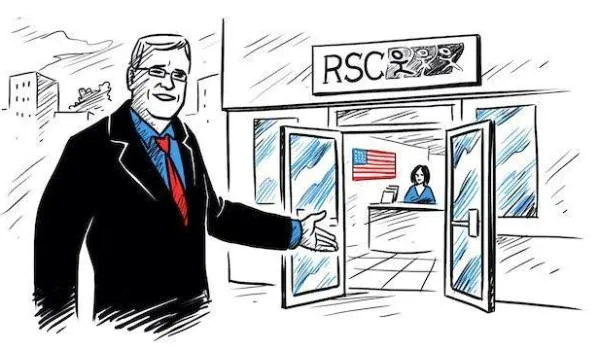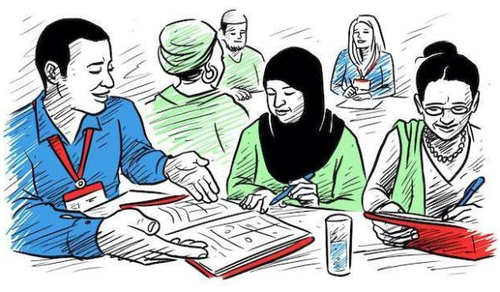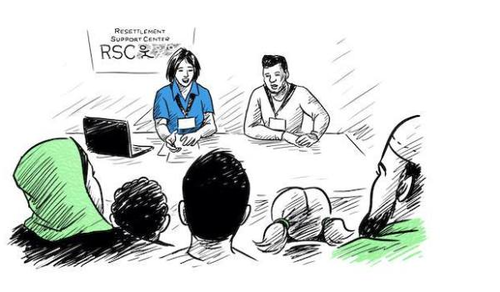Step 1: Prescreening Interview

Prescreening Interview
An RSC caseworker will look at your identifying documents and create a case file for you (and your family, if you are applying together). He or she will ask you important questions about how and why you fled your country of origin, and will compile the biographic information needed for initial security checks. He or she will also ask you to provide biographic information about many of your relatives, even if they are not with you. An RSC staff person will also take your photograph during this visit.
After your prescreening interview, your information will be sent to other U.S. Government agencies for security checks. These agencies investigate the information you have provided to make sure that it is true and accurate. Sometimes, security clearance can take many months to complete and, in some cases, may not be granted by the U.S. Government.
The RSC caseworker is responsible for collecting information concerning your application for resettlement to the United States as a refugee. During your prescreening interview, the caseworker will record your story about the reasons why you left your country and why you feel you cannot return to your country now.
If the caseworker does not speak your language, an interpreter will be provided by the RSC. RSC interpreters are highly trained and professional. The interpreter’s responsibility is to help you and your caseworker communicate. The interpreter will not add to or leave out any part of your story. They will interpret everything you and the caseworker say and change nothing in the meaning of your words. If you have concerns about the interpretation, please communicate this. At any time during this interview you may ask any questions or request that the caseworker repeat or rephrase a question if you do not understand or if something is unclear. You may also talk to an RSC staff if you do not feel comfortable or do not feel like you can communicate well with your interpreter.
It is your obligation to be honest. You must always be accurate and truthful in every detail. Never make up answers. If you do not know the answer to a question, you should state that you do not know. Your answers should be as specific, accurate, and complete as possible. The caseworker will record your account of your claim for refugee status, especially the reasons that led you to leave your country and make you unwilling to return. This information will be maintained in your file which will be submitted to the United States Citizenship and Immigration Services, or USCIS.
Confidentiality: All of your discussions with the RSC caseworker are confidential and for the purposes of consideration for resettlement to the United States. Interpreters have taken an oath to protect the information discussed during your interview. RSC caseworkers and interpreters do not have any influence over the outcome of your case. Only USCIS can decide if you are eligible for resettlement.


Frequently Asked Questions
Come to your prescreening interview with whatever identifying documentation you have for yourself and all family members on your case. As a refugee, many of your personal documents may have been lost or destroyed, and that is understandable. Your caseworker will let you know if more documentation is necessary. You should bring the originals of any documents you have; if you do not have the originals, bring copies.
Below is a list of documents that may be useful at your prescreening interview. If you have them, you should bring the originals or copies with you to the appointment:
- UNHCR refugee certificates / UNHCR refugee ID cards / UNHCR registration documents
- Passports or travel documents (including expired travel documents)
- National identification cards
- Citizenship certificates
- Temporary identification cards for foreigners
- Birth certificates
- Marriage licenses
- Divorce documents
- Custody documents
- Adoption documents
- Death certificates, if relevant to the persecution claim
- Religious documents (baptism, marriage, temporary marriage certificate, death)
- Employment documents, if relevant to your refugee claim
- Educational documents/diplomas
- Important medical documents (findings and prescriptions)
- Medical form with a due date in case of pregnancy
- Threat letters
- Police/military summoning letters
- Court documents for any crimes you have been charged with or convicted of, anywhere in the world
- Media publications regarding your case (newspaper articles, relevant e-mails)
- Military papers and other documents such as identification cards, certificates, military discharge, or permit to carry weapons
- Red Cross certificate (in case of being registered as a prisoner of war)
- Recommendation letters, if relevant to your claim
- Names, addresses, and phone numbers of U.S. ties (friends and relatives already living in the United States)
When you arrive at the RSC or interview location, you will go through a security screening (metal detector) and you will be required to leave all electronics, including mobile phones, in a secure location for the duration of your time at the RSC.
You may have a long wait at the RSC or interview location before your interview. RSC staff will make this time as comfortable for you as possible, but your patience will be appreciated. If you have questions or concerns while you are waiting, please address them to RSC staff or security officers in the waiting area.
Your children may not be left unattended at any time. Please bring snacks for your children, diapers (if needed), and toys or other activities to keep them occupied.
On the day of your pre-screening interview, an RSC staff member will take your photo, height and weight. A USCIS officer will take fingerprints of every applicant age 14 and older. This may happen on the day of your prescreening interview or on the day of your USCIS interview.
You will be escorted from the waiting area to your interview by an interpreter or RSC staff member. Note that interpreters have been instructed not to speak with you about your case. Please direct all your case inquiries to your caseworker. All RSC caseworkers wear an RSC identity badge so that you can easily identify them.
You will be interviewed by one of the RSC’s trained and qualified caseworkers. The RSC caseworker is required to ask you many questions. Your answers are presented to USCIS for their evaluation of your eligibility for resettlement to the U.S. We understand that some of these questions may be difficult for you to answer. We appreciate your patience with this process.
Once you have completed your interview and have been released by your caseworker, you are free to leave the RSC or interview location.
Please anticipate many months between your prescreening interview with your RSC caseworker and your USCIS interview. Your application will not be forgotten or lost.
When it is time for your USCIS interview, the RSC will notify you. In the meantime, it is very important you keep in touch with the RSC regarding any changes to your case such as the birth of a child, death of a family member, marriage of a family member, or changes in your location or contact information.